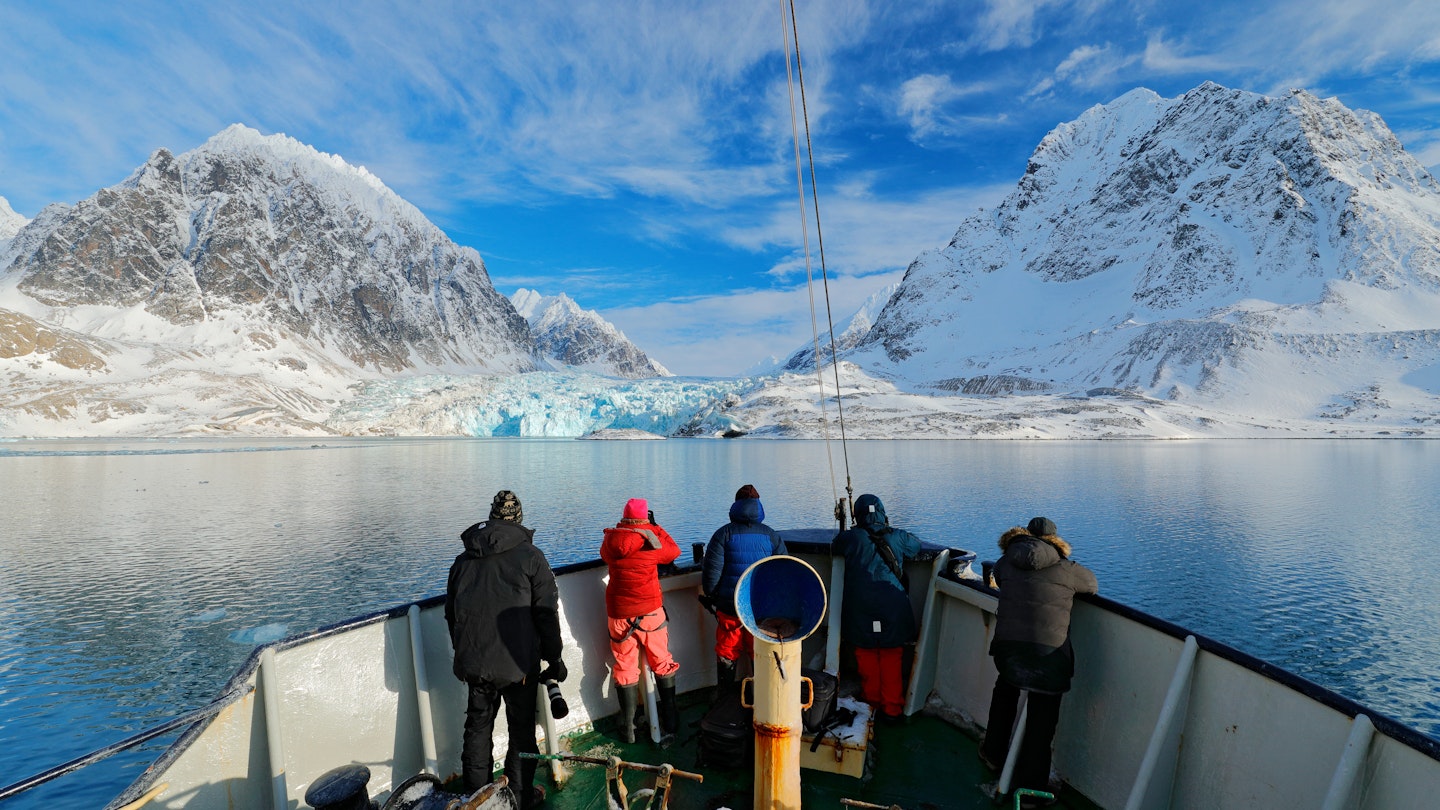Travel Guide to Svalbard
Your first visit to Svalbard may seem a bit daunting – located midway between Norway and the North Pole, this remote Norwegian island is a land of extreme climate, glaciers, and polar bears. This, combined with Svalbard’s unique laws, can make it feel far removed from the rest of the world.
The Svalbard archipelago consists of three main islands: Spitsbergen, Edgeøya, and Nordaustlandet. Most of the tourist activity takes place on Spitsbergen, centered around the settlement of Longyearbyen. Accommodation options are mostly traditional hotels, though a small number of hostel rooms and self-catering apartments are available near Longyearbyen.
Why You Should Visit Svalbard
If you’ve ever dreamed of waking up to a view of glaciers glittering in a sun that never sets or dog-sledding under the northern lights, Svalbard is the destination for you. Moreover, accessible from mainland Norway, this archipelago retains a real sense of adventure, and its main town, Longyearbyen, is a frontier outpost nestled on the edge of one of the harshest and most awe-inspiring wildernesses in the world.
If you’re intrigued by the polar north, Svalbard should definitely be on your list – realistically, this is the farthest north most people are ever likely to get. Wrap up and spend as much time as you can exploring the wild landscapes. Wildlife watching, glacier-spotting cruises, and kayak trips are excellent during summer. Alternatively, you can opt for a hike with proper safety precautions (remember, this is polar bear country) or hop on a snowmobile or take a ride on a dog sled any time of year.
Do I Need a Visa for Svalbard?
You do not need a visa to travel to Svalbard specifically; however, you’ll likely pass through mainland Norway on your way, which requires a Norwegian visa. Interestingly, you do not even need a visa to work in Svalbard! If you’re captivated by your trip and wish to relocate, it’s legal for anyone of any nationality to immigrate – you just need to acquire employment and housing prior to arriving.
How Do I Get to Svalbard?
Both Norwegian Air and SAS fly from Oslo to Longyearbyen, with flights available almost daily. You can also fly from Tromsø; if your flight states it is direct from Oslo, it may still stop at Tromsø for passport control.
The Best Time to Visit Svalbard
Most people visit Svalbard during the summer season (May to September), as the snow begins to melt, making it easier to get around. This is also the best time for wildlife watching. In June, there’s a good chance of spotting walruses, polar bears, and even whales during cruises. The extended daylight lasts until the end of August when the sun begins to set again, making summer visits an easier experience.
Is it Easy to Get Around Svalbard?
Public transport options in Svalbard are limited, with the exception of a shuttle bus to Longyearbyen from the airport. The journey takes just minutes and costs 170 NOK for a return ticket. Most visitors explore the area outside town on guided excursions that often include transfers to and from accommodation. Tour operators can also arrange rented snowmobiles if you wish to drive one yourself.
Safety Precautions When Leaving Longyearbyen
As you approach the town limits of Longyearbyen, you’ll encounter striking road signs featuring a polar bear. Past these signs, it’s vital to have equipment to deter polar bears, such as a flare gun with multiple flares. If you are planning to travel independently, familiarize yourself with extensive safety precautions and regulations from the Governor’s office beforehand.
What to Pack for the Svalbard Weather
Here’s a packing list to ensure you’re prepared for all the Svalbard adventures you can handle:
- Long wool underwear
- Wool socks and gloves
- Fleece layer
- Outer wind-proof layer
- Waterproof boots
- Slippers
- Comfortable indoor clothes for your hotel
- A camera with a long lens
For winter, include a down jacket, crampons for your shoes, a headlamp, and a reflective vest. For summer, don’t forget sunscreen, good-quality sunglasses, and an eye mask.
How Much Money Do I Need in Svalbard?
Svalbard is not a cheap destination, particularly if you aim to pack your itinerary with excursions. Day-to-day living costs are similar to other Scandinavian destinations, but the absence of VAT can offset some prices. Below are average daily costs:
- Hostel room – 1000–1900 NOK
- Basic room for two – 1900–3100 NOK
- Self-catering apartment – 1500–3000 NOK
- Coffee – 40 NOK
- Dinner for two – from 300 NOK for pizza to 900 NOK for steak
- A pint of beer at the bar – 80 NOK
Final Thoughts
Embarking on an adventure to Svalbard promises an unforgettable experience amidst stunning landscapes and unique wildlife. Ensure you’re well-prepared, respect the local environment, and most importantly, enjoy every moment of your Arctic journey.




